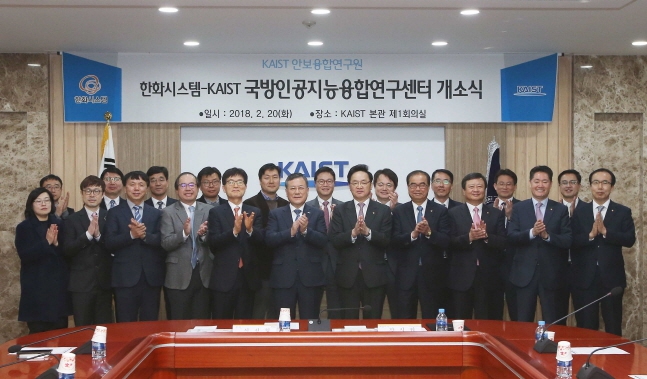 |
|
Representatives from KAIST and Hanwha Systems pose for a commemorative photograph during a ceremony for the opening of the Research Center for the Convergence of National Defense and Artificial Intelligence at the university’s Daejeon campus on Feb. 20. (provided by Hanwha Systems)
|
“It is regrettable that a prestigious institution like KAIS looks to accelerate the arms race,” the researchers stated
Around 50 global scholars working in artificial intelligence (AI) and robotic research announced plans on Apr. 5 to cut ties with the Korea Advanced Institute of Science and Technology (KAIST) in protest of its joint AI weapons research with Hanwha Systems. In a letter, KAIST explained that the goal was its research was “not to develop weapons for killing, injuring, or attacking,” but the boycott declaration was not immediately withdrawn. On Feb. 20, KAIST held a ceremony for the opening of its Research Center for the Convergence of National Defense and Artificial Intelligence with Hanwha Systems. KAIST explained the purpose of the center was for development of algorithms for defense industry distribution systems, unmanned aviation, and intelligence flight training systems. The center’s opinion resulted in an open letter by around 50 AI and robot engineering researchers from 30 countries, including University of New South Wales professor Toby Walsh. “It is regrettable that a prestigious institution like KAIST looks to accelerate the arms race to develop such weapons,” the letter read. “We therefore publicly declare that we will boycott all collaborations with any part of KAIST until such time as the President of KAIST provides assurances . . . that the Center will not develop autonomous weapons lacking meaningful human control,” it continued. As examples of boycott measures, the scholars listed refusal to visit KAIST, receive visitors from KAIST, or participate in research connected to KAIST. Recent years have seen the emergence of strong international opinion that human beings must bear final responsibility for acts of killing, and that it is not right for robots to make strike decisions according to algorithms. The issue of AI-based weapons is also expected to be discussed at a Convention on Certain Conventional Weapons (CCW) conference taking place in Geneva on Apr. 13–17. This appears to be the backdrop for the outpouring of concern from scholars that KAIST’s research could be linked to the development of “killer robots.” KAIST immediately responded with a statement insisting the center would “not conduct any research activities counter to human dignity including autonomous weapons lacking meaningful human control” or research on WMDs and attack weapons in conflict with human ethics, and letters in the name of university president Shin Sung-chul were sent to the scholars who signed the letter. Some replied that they were grateful for the explanation, but Walsh, who led the campaign, reportedly responded in an email that he would discuss the matter of withdrawing the boycott with their other signatories. “Hanwha Systems is a total AI solutions software company, and the center’s main purpose is to develop AI base programs to be used by Air Force pilots doing simulation training,” explained Du Won-su, head of KAIST’s public relations office. “Under South Korea’s weapons development system, universities cannot participate in the weapons development process.” In its report on the situation, the Financial Times wrote that Hanwha Systems was “involved in the production of cluster munitions,” a type of large bomb that separates into hundreds of smaller bombs to injury and/or kill multiple people and has been criticized for its use in the indiscriminate killing of innocent civilians. “Cluster munitions are made by Hanwha, while Hanwha Systems is a company that was previously Samsung Thales before being merged into the Hanwha Group in 2015,” a Hanwha Systems official explained. By Lee Keun-young and Lee Jeong-hun, staff reporters and Cho Ki-weon, Tokyo correspondent Please direct questions or comments to [english@hani.co.kr]





